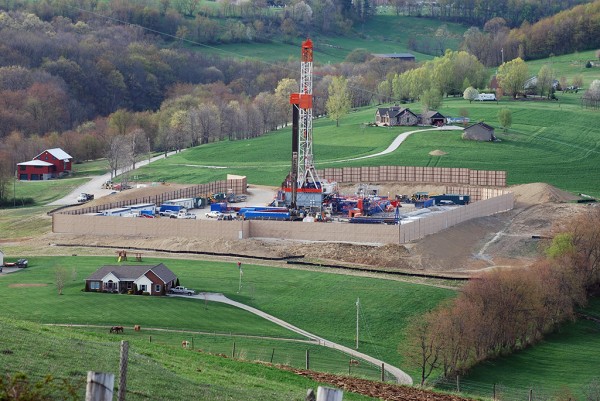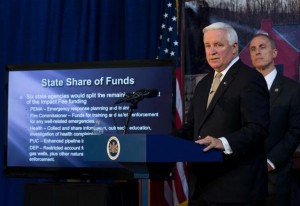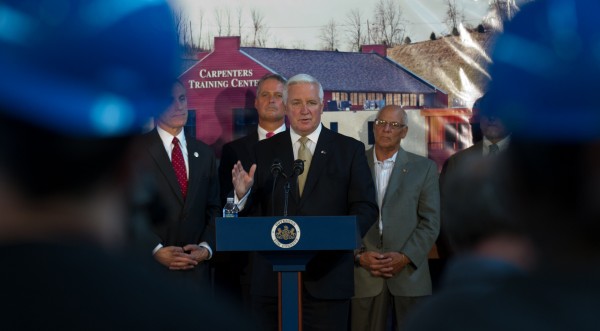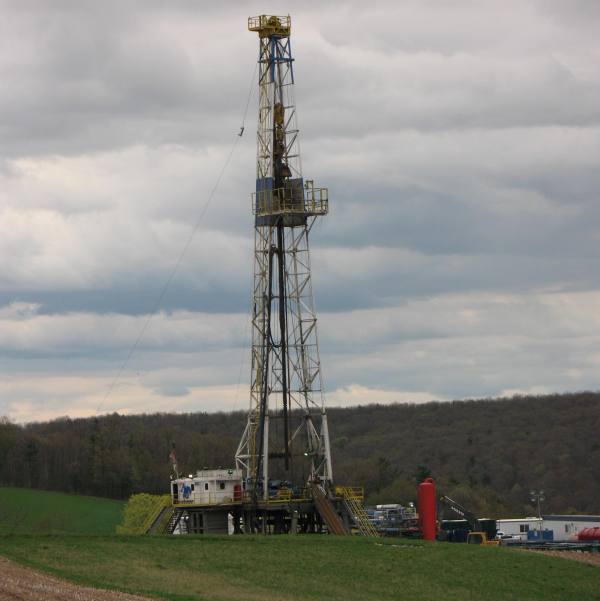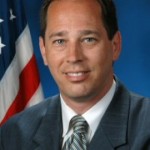Posts
House, Senate Pass Marcellus Shale Bills
/in News /by PAMattersA wide-ranging Marcellus Shale impact bill, similar to what Governor Tom Corbett proposed in October, passed the state House on Thursday afternoon. The bill includes both a per-well impact fee and a series of new environmental regulations, but Democrats like Mike Hanna (D-Clinton) say it’s not enough. “We must vote no on Governor Corbett’s tax bill because it is completely inadequate and can be more accurately characterized as a massive giveaway to the multimillion dollar oil and gas industry,” Hanna said during floor debate. Hanna, however, was on the losing end of a 107 to 76 House vote.
The impact fee that passed the Senate on Tuesday (29 – 20) would charge drillers more money, over a longer period of time. It would amount to an effective tax rate of 3%. “We’re not the lowest in the country and we’re not the highest,” explained President Pro Tem Joe Scarnati (R-Jefferson). “But we’re in competition; we’re in competition for jobs.” In 2012, Senate Republicans say the impact fee would raise a minimum of $155-million.
House and Senate Republicans must now iron out the differences between the two bills. “What we have to do is get everybody sitting down at the table to talk about it, but we’re finally moving,” Corbett told a gaggle of reporters earlier in the week.
Meanwhile, former Governor Ed Rendell is still backing a more significant severance tax on natural gas drilling. “To my colleagues, both Republicans and Democrats in southeast Pennsylvania, if you vote for either of these bills and don’t insist on a real tax, you are courting political suicide,” Rendell said at a recent capitol appearance. “Because you should see what the feeling is in southeast Pennsylvania.”
Governor Tom Corbett on natural gas impact fees
/in Ask the Governor, Media, News, Video /by PAMattersSome Question the Structure of Gov’s Impact Fee
/in News /by PAMattersThe Marcellus Shale plan that Governor Tom Corbett rolled out provides for an “impact fee” to be adopted by the counties where the natural gas drilling takes place. In the first year, counties could impose a per-well fee of up to $40,000 dollars. The maximum fee would drop over the next several years, but Corbett says the revenue would actually grow along with the number of wells.
The County Commissioners Association of Pennsylvania (CCAP) supports the direction of Corbett’s Marcellus Shale plan. “Our only issue with the proposals is a significant concern that we have with the plan that the local impact fee would be levied separately by the counties,” CCAP executive director Doug Hill said in an interview with Radio PA. “It needs to be uniform, it needs to be consistent, it needs to be predictable, and that does not happen if it is county-by-county, with the potential for varying rates within the counties.”
Some lawmakers agree. “This proposal only authorizes counties to impose a fee, it doesn’t require them to impose a fee,” says State Senator John Yudichak (D-Luzerne), the minority chair of the Environmental Resources and Energy Committee. In a statement, State Rep. Mike Sturla (D-Lancaster) called the plan complicated and ill-conceived.
But Governor Corbett calls the structure of his proposed “impact fee” important to the package. “If you bring the money here to Harrisburg first, history demonstrates to us that administrations and legislatures – the money goes into the General Fund – start raiding the General Fund for other budgets,” Corbett explained to reporters on Wednesday. “I believe the money needs to go where the impact is.”
Under the Corbett plan, 75% of the impact fee would be retained at the local level. The remaining 25% would be divvied up among PennDOT, the Department of Environmental Protection, PEMA and more.
Governor Corbett Announces Marcellus Shale Proposal
/in News /by PAMattersGovernor Corbett has released his plan for the Marcellus Shale industry, calling for some stronger regulations, an impact fee and the development of green corridors for natural gas vehicles. He made the announcement after weeks of reviewing the recommendations of his Marcellus Shale Advisory Commission.
The Governor’s proposed impact fee on Marcellus Shale wells would be adopted by counties. He says 75% would be shared among each county and its municipalities. Twenty-five percent would go to the state, with the largest share to PennDOT and the rest split among the Department of Environmental Protection, Pennsylvania Emergency Management Agency, the Pennsylvania Public Utility Commission, and the State Fire Commissioner.
The Governor is also calling for enhanced environmental standards for drilling operations, and higher penalties for violations. He wants to increase the gas well setback distance from water wells and public water supplies. He would also increase the well setback distance from streams, rivers, ponds and other bodies of water. He wants to increase the well bonding fee.
The Governor’s plan would allow DEP to take quicker action to revoke or withhold permits for operators who consistently violate the rules.
The impact fee would be up to $40,000 per well in the first year, $30,000 in the second, $20,000 in the third and no more than $10,000 in years four through ten. He says that’s a total of $160,000 per well. Governor Corbett says estimates show that the fee would bring in about $120 million dollars in the first year and $200 million within six years.
Of the 75% that would stay at the county collecting the fee, Governor Corbett says 36% would be retained by the county, 37% would be distributed to municipalities that host the drilling pads and the remaining 27% would be distributed to all municipalities in a county that is impacted by Marcellus using a formula based on population and highway miles.
Governor Corbett says the money could be used for things such as road maintenance and repair, water and sewer system construction and repair, projects to increase affordable housing for low income residents, social services and municipal planning.
The Governor says he will seek to develop green corridors in the state for natural gas vehicles. He says we have all this gas; we need to have a market for it.
Governor Corbett says the energy under our feet is going to be fueling the state’s economy, heating the homes, lighting houses and businesses for generations to come. He says it’s cleaner and it creates much fewer emissions. He says energy means jobs. The Governor made his announcement at a carpenters’ training facility in Pittsburgh Monday morning.
Some Call for Special Session on Marcellus Shale
/in News /by PAMattersIt’s been three years of discussion and debate, but there’s been no comprehensive action on Marcellus Shale issues in Harrisburg. Now with a series of consensus recommendations from the governor’s Marcellus Shale Advisory Commission in hand, the Pennsylvania Environmental Council (PEC) is calling for a special session this fall. “We feel that there is now no reason not to enact these changes to the Oil and Gas Act,” says John Walliser, the PEC’s vice president for legal and governmental affairs.
The Pennsylvania Environmental Council was represented on the 30-member commission, and participated in the unanimous vote in favor of the 96-recommendations. “If you have the agreement among the different members participating on the report, we think there is every reason to get those enacted as soon as possible,” Walliser says.
Agreeing with the PEC’s call for a special session is State Rep. Camille “Bud” George (D-Clearfield), the minority chairman of the Environmental Resources and Energy Committee. George says the commission’s recommendations are a good first step, but too vague. “The commission gives us too many feel-good, unspecific generalities,” George said in an interview with Radio PA.
Rep. George has introduced legislation (HB 1800), which combines environmental protections with a Marcellus Shale severance tax. It contains a number of recommendations made by the Marcellus Shale Advisory Commission. “But I make the land and water safeguards stronger,” George says.
George is proposing a volume-based severance tax, which directs revenues toward local governments, environmental programs and infrastructure repair. The bill, dubbed ProtectPA, would tax natural gas companies 30-cents per every 1,000 cubic feet of natural gas severed. It has the support of top House Democrats, but will likely not be considered, because it is a tax.
“I’m not against the gas people, and I mean that from the bottom of my heart,” George says. But, the veteran lawmaker adds that his main concern is protecting Pennsylvania’s water.
Governor Tom Corbett has said he would not sign a severance tax, but has left the door open for an impact fee. The commission’s 137-page report recommends such an impact fee, which would mitigate the impacts caused to local municipalities by natural gas drilling.
Expect “Impact Fee” Debate This Fall
/in News /by PAMattersThe governor’s Marcellus Shale Advisory Commission has voted to recommend it, and the industry even endorses it. “The industry and the Marcellus Shale Coalition has been very clear of its support of an impact fee that’s competitive, that’s styled to address the un-met needs of local governments,” said Marcellus Shale Coalition president Kathryn Klaber.
Klaber stressed that the Marcellus Shale Coalition supports a “competitive” impact fee, citing a new study of the economic impacts of the booming Marcellus Shale industry. “What we’re seeing in this study are some very large numbers in terms of economic activity and tax benefits… and we wouldn’t want to change that mix so much that we’d be thwarting the kind of investment that this study highlights.”
Asked about the prospects of an impact fee on Thursday, Senate President Pro Tem Joe Scarnati (R-Jefferson) said further discussions are needed. “I’m open to ideas, but certainly I want to see as much driven back to where the drilling activities are. Impact fee is certainly an appropriate name for what we’re trying to address here,” Scarnati told reporters. He does acknowledge, however, that it would be difficult to pass an impact fee bill, which doesn’t provide some money for statewide environmental projects.
While the stars appear to be aligning in favor of an impact fee this fall, not everyone is one board. “The local impact fee is too narrowly conceived. There are impacts of natural gas drilling that fall well beyond communities that actually have natural gas wells,” said Sharon Ward, director of the Pennsylvania Budget & Policy Center. Ward supports a broader severance tax, and so do House Democratic leaders. They’re backing a new bill that would tax gas producers 30-cents per 1,000 cubic feet of natural gas severed.
However, Governor Tom Corbett has made it clear that he will not sign a severance tax. He’s previously left the door open for an impact fee – as long as no money is used for the General Fund – but has not commented publicly on the advisory commission’s recommendations. The Marcellus Shale Advisory Commission’s final report is expected to be released on Friday.
Industry-Backed Study Details Benefits of Marcellus Shale Boom
/in News /by PAMattersPennsylvania is now a net exporter of natural gas, and has the potential to account for 17.5-billion cubic feet of natural gas, per day. President of the Marcellus Shale Coalition, Kathryn Klaber, says that would be one-quarter of the nation’s natural gas production. The new study, The Pennsylvania Marcellus Natural Gas Industry: Status, Economic Impact, and Future Potential, was conducted by Penn State researchers, and commissioned by the Marcellus Shale Coalition.
Kathryn Klaber says PA’s shale industry has blown its projections out of the water. “At the beginning of 2010, it was projected that Pennsylvania would be producing a billion cubic feet equivalent per day by the end of 2010, and we saw that it was double that.”
The study also projects that Marcellus Shale development could support 156,000 PA jobs this year, and more than 256,000 PA jobs by 2020. “Every dollar that’s invested in building one of these wells involves more people to do that work, to run the equipment, and to do everything throughout the supply chain,” Klaber said.
But, the Pennsylvania Budget and Policy Center contends those jobs numbers are overstated. “Overall, we welcome the gas industry’s contribution to Pennsylvania’s economy, but with this study, the industry continues to overstate the economic benefits and underestimate the costs of increased drilling in the Marcellus Shale,” PBPC director Sharon Ward said in a statement.
The study is being released less than a week after the governor’s Marcellus Shale Advisory Commission voted for a series of 96-recommendations, including a local impact fee. “The industry and the Marcellus Shale Coalition has been very clear of its support of an impact fee that’s competitive, that’s styled to address the unmet needs of local governments,” Klaber said in an interview with Radio PA.
Governor Corbett’s Marcellus Shale Commission Endorses an Impact Fee
/in News /by PAMattersThe Governor’s Marcellus Shale Advisory Commission is recommending an impact fee that directs money to local governments to deal with the effects of drilling. Lt. Governor Jim Cawley, who headed the commission, says it does not recommend what the fee should look like or how it would be distributed. He says they believe that’s a matter that best resides in the legislative process.
Cawley says their charge from Governor Corbett was to determine whether or not there were uncompensated impacts that might require an impact fee. He says in some cases they found that there are. He says what that fee what look like is a matter for the administration and legislature to tackle.
Cawley called the report the “end of the beginning.” He says the document will be a recommendation to the Governor. No work begins until he says go. A final written version of the report based on Friday’s voting was being prepared to present to the Governor. It will be made public on July 22nd.
The panel also recommended a new look at the 1961 law regulating gas extraction, to revisit language barring “forced pooling” of Marcellus gas. Patrick Henderson, the governor’s energy executive, says other formations are subject to pooling under that law, including the Utica Shale. Forced pooling could compel a landowner to lease out mineral rights if most of their neighbors have agreed to leases.
The report of the commission comes after a series of meetings that began in late March. The commission also made a number of other recommendations regarding
emergency response and economic and workforce development related to the Marcellus Shale boom. A number of the recommendations will require legislative action.
Welcome to PAMatters.com, a new source for news and commentary from Pennsylvania’s capital. In addition to video, audio and pictures from the stories and events that affect YOU, you’ll also get some behind-the-scenes analysis via blogs from our award-winning staff of journalists.




